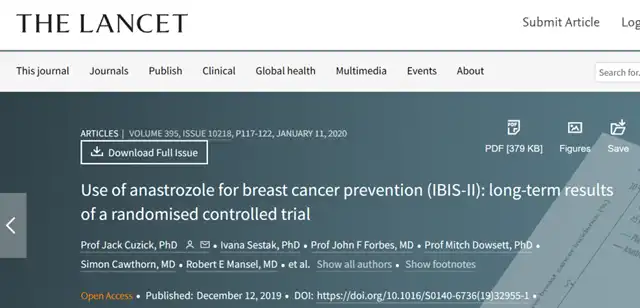Breakthrough Study: Anastrozole Reduces Breast Cancer Risk by 49%
- Normal Liver Cells Found to Promote Cancer Metastasis to the Liver
- Nearly 80% Complete Remission: Breakthrough in ADC Anti-Tumor Treatment
- Vaccination Against Common Diseases May Prevent Dementia!
- New Alzheimer’s Disease (AD) Diagnosis and Staging Criteria
- Breakthrough in Alzheimer’s Disease: New Nasal Spray Halts Cognitive Decline by Targeting Toxic Protein
- Can the Tap Water at the Paris Olympics be Drunk Directly?
Breakthrough Study: Anastrozole Reduces Breast Cancer Risk by 49%
- Should China be held legally responsible for the US’s $18 trillion COVID losses?
- CT Radiation Exposure Linked to Blood Cancer in Children and Adolescents
- FDA has mandated a top-level black box warning for all marketed CAR-T therapies
- Can people with high blood pressure eat peanuts?
- What is the difference between dopamine and dobutamine?
- How long can the patient live after heart stent surgery?
Breakthrough Study: Anastrozole Reduces Breast Cancer Risk by 49%
Breast cancer, a leading global malignancy, has witnessed a groundbreaking development in risk reduction. Postmenopausal women, prone to higher estrogen levels, face an elevated risk of breast cancer.
Aromatase inhibitors, such as anastrozole, have emerged as the most effective preventive medication for estrogen receptor-positive breast cancer.
In a 2020 study published in The Lancet, researchers explored the role of anastrozole in preventing breast cancer. Over a period of 2003-2012, 3,864 women participated, with nearly 50% taking anastrozole continuously for five years, while the rest received a placebo.
After a 12-year follow-up (7 years post-treatment cessation), women on anastrozole exhibited a 49% reduction in breast cancer risk. Notably, the risk dropped by 54% for invasive estrogen receptor-positive breast cancer and 59% for ductal carcinoma in situ.

screenshot from Lancet
Recently, Anastrozole received approval from the UK Medicines and Healthcare Products Regulatory Agency (MHRA) for breast cancer prevention. Starting from November 7, 2023, women in the UK at moderate to high risk of breast cancer can lower their risk by taking anastrozole. However, it’s important to note that anastrozole is only suitable for postmenopausal women, as it does not inhibit estrogen in younger females.
Despite its efficacy, anastrozole use comes with side effects such as gastrointestinal discomfort, thrombosis, and endometrial cancer risk. Therefore, finding the optimal balance between managing cancer risk and minimizing drug side effects is crucial.
On December 6, a study published in The Lancet Oncology provided essential metrics to assess the benefits of anastrozole in women. The research identified estradiol levels measured through blood tests as a crucial indicator of the drug’s effectiveness. This offers a better method to identify women who can benefit most from anastrozole in reducing breast cancer risk.
The study, analyzing data from the IBIS-II prevention trial, found that higher estradiol-SHBG ratios in women on a placebo correlated with an increased breast cancer risk. In the anastrozole group, this trend was absent. Women with higher estradiol-SHBG ratios receiving anastrozole had a 55% reduced risk, emphasizing the personalized approach in maximizing benefits.

screenshot from Lancet Oncology
These findings suggest that a simple and affordable blood hormone test can determine which women will benefit the most from aromatase inhibitors’ preventive treatment. This personalized approach allows women to receive more accurate prevention, striking a balance between managing cancer risk and minimizing drug side effects.
Researchers express excitement over these results, envisioning improvements in the selection of preventive medications for postmenopausal women at high risk of breast cancer. The UK Cancer Research Center plans to conduct larger-scale trials based on these results, further elucidating the appropriate population for anastrozole breast cancer prevention.
References:
Jack Cuzick, Kim Chu, Brian Keevil, Adam R Brentnall, Anthony Howell, Nicholas Zdenkowski, Bernardo Bonanni, Sibylle Loibl, Kaija Holli, D Gareth Evans, Steve Cummings, Mitch Dowsett. Effect of baseline oestradiol serum concentration on the efficacy of anastrozole for preventing breast cancer in postmenopausal women at high risk: a case-control study of the IBIS-II prevention trial. The Lancet Oncology, 2023; DOI: 10.1016/S1470-2045(23)00578-8
(source:internet, reference only)
Disclaimer of medicaltrend.org
Important Note: The information provided is for informational purposes only and should not be considered as medical advice.



